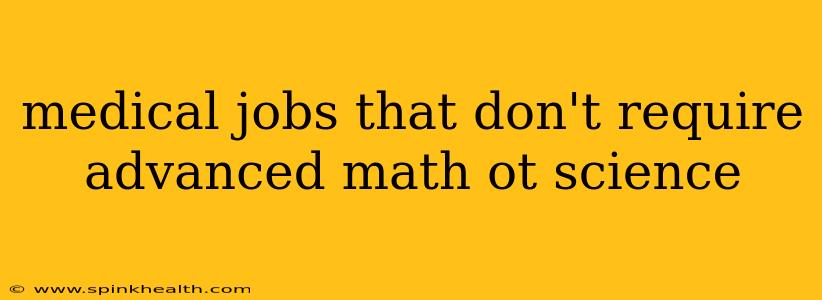Medical Jobs That Don't Require Advanced Math or Science: A Rewarding Career Path
The world of medicine isn't just about doctors and surgeons wielding scalpels and microscopes. It's a vast ecosystem of interconnected roles, many of which offer fulfilling careers without demanding advanced math or science expertise. If you're drawn to the healthcare field but aren't a whiz with complex equations or intricate biological processes, don't despair! Numerous rewarding options exist, offering a chance to make a difference in people's lives. Let's explore some of them.
My own journey into researching this topic started with a personal connection. A close friend, always compassionate and empathetic, found her true calling in medical administration, leaving a stressful corporate job for a far more rewarding career. This sparked my interest in exploring the less scientifically demanding, yet equally crucial, roles within healthcare.
1. Medical Assistant:
Medical assistants are the backbone of many clinics and doctor's offices. They handle a wide variety of tasks, including taking patient vital signs, preparing examination rooms, assisting physicians during procedures, and scheduling appointments. While some basic medical knowledge is required, this role prioritizes strong interpersonal skills, organizational abilities, and attention to detail far more than advanced scientific understanding.
2. Medical Secretary/Administrative Assistant:
These roles focus on the efficient management of medical offices. This could involve answering phones, scheduling appointments, managing patient records (often using electronic health records systems), handling insurance claims, and coordinating with other healthcare professionals. Proficiency in computer software and excellent communication skills are key to success in this field.
People Also Ask: What are the educational requirements for a medical secretary?
Most medical secretary positions require a high school diploma or equivalent, along with specialized training in medical terminology and office management. Some employers may prefer candidates with an associate's degree. On-the-job training is also common.
3. Pharmacy Technician:
While a basic understanding of medications is essential, pharmacy technicians primarily assist pharmacists in dispensing medications, maintaining inventory, and answering patient questions. Strong attention to detail and organizational skills are paramount. Formal training or certification is usually required, but the focus is on practical skills rather than advanced scientific concepts.
4. Medical Coder/Biller:
These professionals translate medical diagnoses and procedures into codes used for insurance billing. They need to understand medical terminology and coding systems (such as ICD and CPT codes), but the work is primarily focused on accurate data entry and adherence to billing regulations. Analytical skills are important, but advanced mathematics isn’t typically required.
5. Healthcare Administrator:
This field encompasses a broad range of management roles within healthcare organizations. From managing hospital departments to overseeing entire healthcare systems, these positions focus on strategic planning, budgeting, resource allocation, and personnel management. Strong business acumen, leadership skills, and understanding of healthcare regulations are far more important than advanced scientific knowledge.
People Also Ask: What kind of math is used in medical billing?
Medical billing involves basic arithmetic for calculations related to patient charges and insurance reimbursements. However, it's more about accuracy and attention to detail than complex mathematical concepts.
6. Phlebotomist:
Phlebotomists are responsible for drawing blood samples from patients. While some understanding of anatomy is helpful, the primary skills needed are dexterity, good communication skills, and the ability to follow established procedures. Formal training is usually required, but it's primarily focused on practical techniques.
7. Medical Social Worker:
Medical social workers provide psychosocial support to patients and their families. They assess patients' needs, connect them with resources, and advocate for their well-being. A strong understanding of social work principles and excellent interpersonal skills are crucial. This career path requires a social work degree but doesn't typically demand advanced scientific expertise.
This is just a snapshot of the many rewarding medical jobs that don't require advanced math or science. If you're passionate about helping people and contributing to the healthcare field, explore these options and discover the career path that aligns with your skills and interests. Remember to research specific educational and certification requirements for each role in your area.

